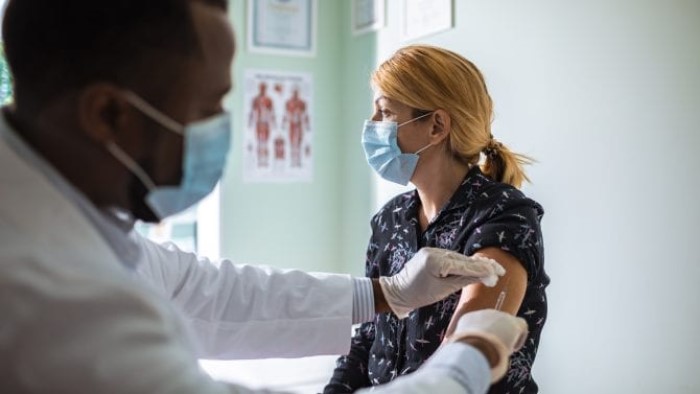COVID-19 Vaccines: What You Should Know

How Does ACA Reporting Affect My Business?
February 5, 2021
How to Improve Your Mental Health While Working From Home
March 2, 2021Disclaimer: Michigan Planners is not the author of this article. But we do have the copyright approval to post Blue Cross Blue Shield material. You can read the original article here.
Editor’s note: This post was first published Jan. 22, 2021 and was last updated 4 p.m. Feb. 4, 2021, with information from state and federal health officials.
Doses of the first COVID-19 vaccines were administered Dec. 14, 2020, kicking off a massive effort during 2021 to stop the spread of the virus.
Michigan health officials aim to vaccinate 90% of Michigan residents 16 years of age or older — at least 7.2 million people — by the end of 2021. Until everyone can receive a vaccine, health experts are urging everyone to follow the same COVID-19 precautions: wear a mask, wash your hands, practice social distancing and limit gatherings outside of your household.
There are currently two vaccines – Moderna and Pfizer-BioNTech – that have received emergency use authorization from the U.S. Food and Drug Administration (FDA) and are being distributed across the country. They both require two doses to be effective. The vaccines are being distributed in phases that differ by state.
Here’s what you need to know about vaccination efforts in the state of Michigan.
Click on a link below to jump to the section in this blog:
| Availability | Locations |
| Two Shots | Side Effects |
| Vaccination Tracker | Effectiveness |
| Prior COVID-19 Infections | Myths |
| Development | At-Risk Groups |
| Cost |
WHEN WILL VACCINES BE AVAILABLE TO ME?
Health officials in Michigan are distributing vaccines in a phased approach per the U.S. Centers for Disease Control and Prevention recommendations. Health care workers and people in long-term care facilities – including staff – were the first to be vaccinated in Michigan, and those efforts are ongoing.
As of Jan. 11, 2021, Michigan announced that additional groups are eligible to receive the vaccine. However, demand for the vaccine during January has been much greater than the supply. Vaccine appointments are being scheduled as shipments of the vaccine become more plentiful.
The following groups are now eligible to receive the vaccine when it becomes available:
- People age 65 and older
- Police officers, firefighters and inspectors
- Pre-K through grade 12 teachers
- Prison and jail officers
- Childcare providers
These prioritizations may change as more information on vaccine effectiveness and additional vaccination products become available. The federal government recognizes that it is not necessary to fully complete vaccination in one phase before moving on to next phase. There may be vaccination of individuals in different phases that occurs simultaneously.
- Find out when you will be eligible for a COVID-19 vaccine by visiting Michigan.gov/COVIDvaccine
WHERE WILL VACCINES BE AVAILABLE?
The Michigan Department of Health and Human Services is working with local health departments and the Michigan National Guard to distribute the vaccine. Due to limited supplies of the vaccine, they are available on an appointment-only basis through the health departments.
- Find a vaccination location in Michigan by visiting Michigan.gov/COVIDvaccine
Hospitals and health systems are working to distribute vaccines to patients, and some commercial pharmacies are engaged on a limited basis in the initial effort. In the future, primary care providers will also be providing vaccines as the supply allows.
The week of Feb. 8, retail pharmacies across the country will begin receiving shipments of COVID-19 vaccines. Initial federal retail pharmacy partners in Michigan include Meijer, Rite Aid, LeaderNET and Medicine Shoppe, Cardinal Health’s PSAOs.
- Text “COVID” to 75049 or visit Meijer’s website at clinic.meijer.com to register
These pharmacies will offer vaccines under the same vaccination schedule followed by health departments and hospitals, in accordance with state and federal vaccination guidelines and dependent upon the shipment of vaccine supply. In the future, most retail pharmacies including Spartan Nash stores will offer COVID-19 vaccines.
Each state is distributing vaccines in a different way. If you live outside of Michigan and are seeking a COVID-19 vaccine, click here to see how to get a vaccine in your state.
After receiving a vaccine, you should continue to wear a mask in public and when in contact with those outside your household.
DO I NEED TWO DOSES OF THE VACCINE?
Yes. Both the Moderna and Pfizer-BioNTech vaccines require two doses to be fully effective. The second dose of each vaccine is identical to the first dose of the same brand. COVID-19 vaccines that require two shots may not protect you until a week or two after your second shot, according to the CDC.
The timing between your first and second shot depends on which vaccine you receive:
- Pfizer: 21 days after your first shot
- Moderna: 28 days after your first shot
In most situations, the vaccination site will schedule you for your second dose when you receive your first dose. Your second shot must be of the same vaccine brand as the first shot
WHAT ARE THE POTENTIAL SIDE EFFECTS?
Side effects to the COVID-19 vaccines may include:
- Pain and swelling at the injection site
- Fever
- Chills
- Tiredness
- Headache
These side effects mean your immune system is responding by producing an immune response and is completely normal. If your side effects do not go away after a few days, call your doctor. Call 911 and seek immediate medical care if you think you’re having a severe allergic reaction.
At this time, the U.S. Centers for Disease Control and Prevention do not recommend taking acetaminophen or other non-steroidal anti-inflammatory drugs like Tylenol or Advil prior to receiving the COVID-19 vaccines to prevent any vaccination symptoms. Patients who take these medications as a part of their current treatment plans should consult their primary care providers first before making any changes.
The CDC has developed a smartphone-based tool called v-safe to check in with people after they have received a COVID-19 vaccine to track side effects. Learn more about v-safe here.
HOW MANY VACCINES HAVE BEEN ADMINISTERED?
As of Feb. 4, 2021, here’s how many vaccines have been administered:
- Michigan: 871,820 first doses and 233,843 second doses
- U.S.: 27,154,956 first doses and 6,436,931 second doses
ARE THE VACCINES EFFECTIVE?
Before these vaccines were authorized for emergency use, they were subjected to clinical trials with thousands of study participants to evaluate safety and effectiveness. Pfizer’s vaccine was shown to be 95% effective against COVID-19, while the FDA reports the Moderna vaccine is 94% effective.
DO THE VACCINES CAUSE COVID-19?
No. The Pfizer and Moderna vaccines do not use the live virus that causes COVID-19. The vaccines use messenger RNA – called mRNA – to teach your cells how to make a protein that triggers the immune response. As your body learns how to protect against a future infection of COVID-19, your body may react with side effects – which means the vaccine is working. The mRNA does not enter the nucleus of the cell, where your DNA is kept.
SHOULD I STILL GET VACCINATED IF I’VE ALREADY HAD COVID-19?
Experts say yes. It’s unclear how long immunity from COVID-19 lasts if you’ve had an infection, so health experts are advising that those who have been infected with COVID-19 should still plan to get the vaccine. It is always a good idea to discuss such decisions with your doctor.
HOW WERE THE VACCINES DEVELOPED SO QUICKLY?
Although the COVID-19 vaccines developed by Pfizer and Moderna were developed more quickly than other vaccines, the FDA announced they followed all established protocols for vaccine development and testing and met the FDA’s standards for emergency use authorization. According to the Michigan Department of Health and Human Services, scientists had a head start thanks to vaccine research already started during previous outbreaks caused by related coronaviruses such as SARS (Severe Acute Respiratory Syndrome) and MERS (Middle East Respiratory Syndrome).
“The process for approval of a COVID-19 vaccine is scientifically sound, and no steps have been skipped, said Dr. Joneigh Khaldun, MDHHS chief medical executive and chief deputy for health.
ARE THERE POPULATIONS WHO CAN’T GET THE VACCINE OR WHO SHOULD PROCEED WITH CAUTION?
There are some groups that might not be able to get vaccinated just yet:
- Those under age 16. While the Pfizer vaccine is approved for persons age 16 and older, the Moderna vaccine’s age requirement is 18. Some additional studies for this age group should be underway.
Some groups might want to talk to their doctor about the best course of action:
- Pregnant women are at high risk for severe illness from COVID-19. The World Health Organization now advises there are no specific risks that would outweigh the benefits of a pregnant woman being vaccinated for COVID-19, and recommends pregnant woman at a high risk for getting COVID-19 or contracting a severe illness from COVID-19 to be vaccinated after consulting with their health care provider. The American College of Obstetricians and Gynecologists recommends COVID-19 vaccines be offered to pregnant women who meet the criteria for vaccination. The vaccine has not been tested in pregnant individuals, although animal studies are ongoing with results expected soon. According to the CDC, “based on current knowledge, experts believe that mRNA vaccines are unlikely to pose a risk for people who are pregnant.”
- People with past severe allergic reactions to vaccines are advised to balance the risks of allergic reaction with the benefits of vaccination, and to be monitored after vaccination for any adverse side effects.
WHAT WILL THE VACCINE COST?
You should not have to pay anything to receive a COVID-19 vaccine. There are two primary costs – the cost of the vaccine, and the cost of administering it to patients like you. The federal government will be paying for the initial cost of the vaccine. Most employer health plans and Blue Cross are required to pick up the cost of administering the shots, thereby relieving members of any out-of-pocket cost.
Blue Cross Blue Shield of Michigan and Blue Care Network will waive all copays, deductibles and coinsurance for COVID-19 vaccines for commercial members.
For Medicare beneficiaries, the government is paying for the vaccine and administration of the vaccine.
This content has been reviewed and approved by Dr. S. George Kipa, deputy chief medical officer at Blue Cross Blue Shield of Michigan.
More from MIBluesPerspectives.com:
- COVID-19: What You Need to Know
- Blue Cross Blue Shield of Michigan will provide $0 cost sharing for COVID-19 vaccine coverage
- Grant: What We Know About the COVID-19 Vaccines
Photo credit: Geber86

